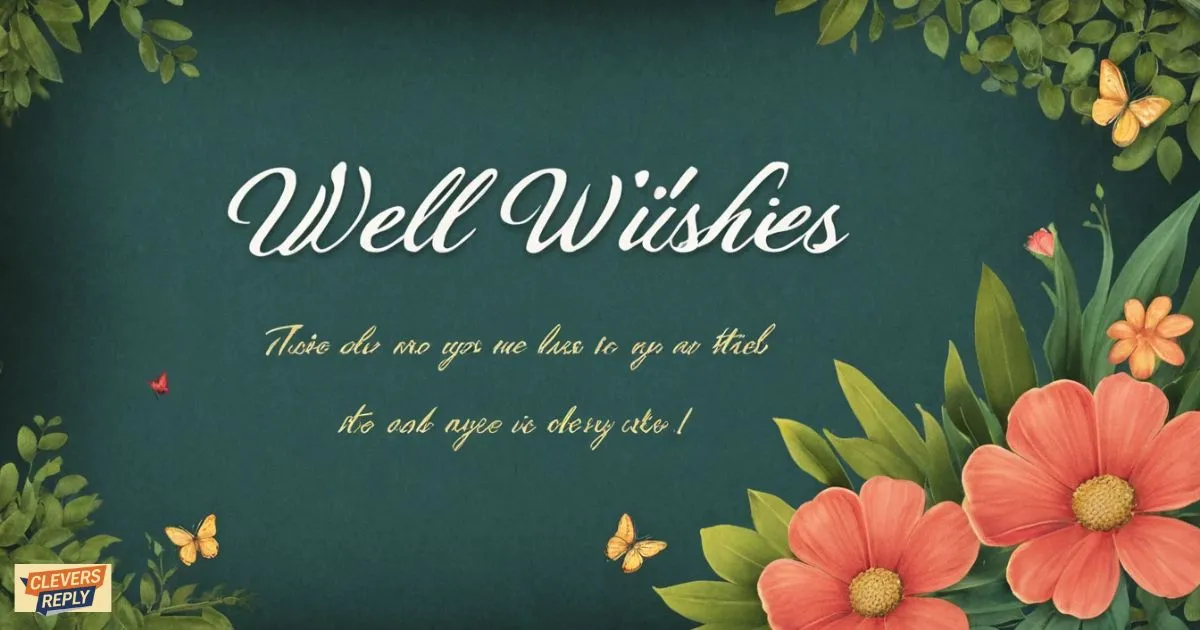“Polite responses to well wishes can leave a lasting, positive impression.”
When someone offers you well wishes, it’s a gesture of kindness and goodwill. When it’s for a birthday, achievement, or during tough times, the way you respond can strengthen your relationships. A polite reply acknowledges the person’s thoughtfulness, and it’s a chance to express gratitude. This blog will explore how to respond politely and meaningfully to well wishes. We’ll offer ideas to make your replies more personal and thoughtful.
Now that you understand the importance of polite responses, it’s time to act! Crafting thoughtful replies doesn’t have to be difficult. By considering the meaning behind the well wishes, acknowledging the kind words, and personalizing your response, you can leave a lasting impression. In this blog, we’ll help you build the right replies for any situation, ensuring that your words reflect your sincerity and gratitude. Let’s get started on how to respond effectively!
Understanding how to respond politely involves more than just saying “thank you.” It’s about making the other person feel valued for their kind gesture. Polite responses are often brief but carry a lot of weight in their meaning. When it’s in person, over text, or in writing, crafting your responses thoughtfully can help deepen bonds. In the following sections, we will explore different ways to acknowledge well wishes in a meaningful way, and we’ll provide helpful suggestions to make sure your replies are genuine and heartfelt.
Understanding Well Wishes
Well wishes can come in many forms—congratulations, sympathy, or even words of encouragement. Understanding what the sender hopes to convey is crucial before you reply. Each type of well wish requires a slightly different approach. For example, a birthday greeting demands a cheerful response, while a condolence message requires sensitivity. By considering the context, you’ll be able to craft a response that acknowledges the sentiment appropriately.
- Reflect on the Sender’s Intentions: Take time to think about why the person is wishing you well. Are they celebrating your success, or offering support in difficult times?
- Be Grateful: Acknowledge the kind thoughts behind the well wishes. Gratitude is key to any response.
- Be Sincere: Authenticity matters more than the wording. Respond from the heart.
- Match the Tone: Tailor your tone to the message. A formal reply works for professional settings, while casual responses are appropriate among friends.
- Don’t Overthink It: Simple, kind responses often work best. You don’t need to write a long message to make it meaningful.
- Remember the Source: Consider who is sending the well wishes. A colleague’s greeting may be different from that of a close friend or family member.

- Include a Personal Touch: If appropriate, share a bit of your own thoughts or feelings in your reply.
- Acknowledge Past Messages: If someone has wished you well previously, thank them for their continued support.
- Be Gracious in Difficult Times: When receiving condolences or sympathy, express appreciation and understanding.
- Respond Promptly: It’s courteous to reply in a timely manner. Delayed responses may seem dismissive.
Steps to Craft Meaningful Replies
Crafting a meaningful reply to well wishes involves more than just saying “thank you.” You can add depth to your response by making it more personalized and engaging. Here are the steps to ensure your reply feels genuine and thoughtful.
- Acknowledge the Thought Behind the Message: Express your appreciation for the person’s kind gesture.
- Stay True to Your Feelings: Be honest in your response. If you’re excited, let it show. If you’re grieving, express gratitude for the support.
- Include Specific Details: Referencing something specific to the sender or the occasion shows attentiveness.
- Use Positive Language: Positive replies spread good energy and help foster a strong connection.
- Mention Future Interactions: If applicable, mention looking forward to future conversations or meetings.
- Adapt to the Medium: Adjust your response to the communication method. A text might be brief, while a letter could be more detailed.
- Express Warmth: Use friendly language to make your reply feel welcoming and appreciative.
- Be Considerate: Respect the context of the well wishes. Don’t make light of serious messages.
- Keep It Short and Sweet: A simple, heartfelt message often has more impact than a lengthy response.
- Avoid Overthinking: Let your response flow naturally from the heart without stressing over perfect wording.
“How to Respond to “Thank You for Your Hospitality”
Think About What It Means to You
When crafting your response, consider what the well wishes mean to you personally. It’s easy to go through the motions, but a reply that reflects your true feelings will always come across as more genuine. Ask yourself:
- Reflect on the sender’s kindness. Acknowledge the care behind their message.
- Consider the occasion. What is the significance of the well wishes being given?
- Evaluate your feelings. How does the message make you feel—happy, supported, or encouraged?
- Recognize the relationship. The depth of the connection with the sender may affect your response.
- Assess the tone. Is the message formal, casual, or heartfelt? Match your tone accordingly.
- Look for sincerity. Do you feel genuine emotion behind their words?
- Relate it to your life. How does their message align with your current situation?
- Think about shared experiences. Is this message linked to something you’ve experienced together?
- Understand their intent. What does the sender want to achieve with their well wishes—celebration, support, or encouragement?
- Consider how it impacts you. How can this message help lift your spirits or strengthen your goals?
Acknowledge the Well-Wishes
A key element of polite responses is acknowledging the sender’s kind words. This shows that you’ve read and appreciated their message. Whether it’s a congratulatory message or words of encouragement, acknowledging their wishes makes the person feel heard. Here are a few ways to do this:
- Say “Thank You” Often: A simple “thank you” can go a long way in showing appreciation.
- Show Enthusiasm: If you’re happy, express it! “I’m so excited—thank you for your kind words!”
- Express Recognition: “Your words really made my day, thank you!”
- Acknowledge the Sender’s Support: “Your support means the world to me, thank you.”
- Confirm Their Good Wishes: “Thank you for wishing me the best on this new journey!”

- Express Humility: “I’m truly grateful for your well wishes.”
- Mention How It Made You Feel: “Your words touched my heart—thank you.”
- Highlight the Importance: “Your wishes really mean a lot to me, thank you for thinking of me.”
- Give Credit Back to Them: “Your kind words are very encouraging, and I really appreciate them.”
- Add a Positive Thought: “I’m excited about the future—thanks for being part of my journey.”
Personalize Your Response
Personalizing your response adds a unique touch to your reply. Rather than just a generic “thank you,” try to tailor your message to the person and the occasion. Here’s how:
- Mention a Shared Experience: “I remember when you went through this—your advice helped me so much!”
- Use Their Name: Adding the person’s name makes the message feel more personal and direct.
- Reference Specific Achievements: “Your well wishes mean a lot after everything I’ve worked for.”
- Use Humor (When Appropriate): A lighthearted joke can make the response feel more natural and fun.
- Express Gratitude for Their Presence: “I’m so thankful to have you in my life to share this moment.”
- Acknowledge the Context: “Your kind words really helped me through this tough time.”
- Relate to Their Experience: “I can’t wait to share more with you as I grow in this new chapter.”
- Thank Them for Their Support: “I’m lucky to have friends like you who are always there.”
- Share Future Plans: “I look forward to seeing you soon, thanks again for your well wishes.”
- Reflect Their Tone: If the person is enthusiastic, match their excitement. If they’re more formal, respond in kind.
Best Replies to Well Wishes | Clever Replies
When you want to be a bit more creative with your replies, here are some clever responses that add a personal flair to your well-wishing replies:
- “Thank you! Your words just made my day even brighter.”
- “I can feel the good vibes all the way here! Thank you so much.”
- “Thanks for the lovely wishes! I hope I can return the favor soon.”
- “Your kind words are exactly what I needed today. Thanks a lot!”
- “You always know how to make me smile—thank you!”
- “Your support is a gift I will never forget, thank you.”
- “Feeling blessed with your kind words. Thank you for being awesome.”
- “Your wishes have added so much joy to my day. Thank you!”
- “Thanks for the beautiful wishes! You just made my week.”
- “Your words are truly appreciated. I’m lucky to have you in my life!”
Tips
- Be Prompt: Responding sooner rather than later shows that you appreciate their kindness.
- Keep it Heartfelt: A sincere response will always be well-received.
- Customize Your Reply: Personalize it based on your relationship with the sender.
- Use Humor Wisely: A bit of humor can make your response stand out.
- Follow Up When Appropriate: If someone offers continued support, check in and show appreciation.
Key Insight
What should I say when I receive well wishes for my birthday?
A simple and warm “Thank you for the birthday wishes! I’m so happy you’re celebrating with me!” works perfectly.
How do I respond to well wishes after a job promotion?
“Thank you for your kind words! I’m really excited about this new chapter and appreciate your support.”
How can I respond to sympathy or condolences?
“Thank you for your heartfelt words during this difficult time. Your support means a lot to me.”
Should I always respond to well wishes?
Yes, responding is a polite and thoughtful way to acknowledge someone’s kindness.
How can I make my response feel more personal?
Use the person’s name, mention something specific they said, or relate it to a shared experience.
Final Word
In conclusion, responding politely to well wishes is an essential part of maintaining positive relationships. If you’re thanking someone for their kind words, acknowledging their support, or adding a personal touch, your reply can reflect your gratitude and sincerity.
By following the steps outlined in this post, you can craft meaningful responses that leave a lasting impression. The next time you receive well wishes, remember to take a moment to respond thoughtfully and make the other person feel valued.

Hi! I’m Jane Austen, the administrator of Cleversreply.com. I’m dedicated to providing thoughtful and professional responses, ensuring that every message conveys gratitude and warmth with elegance.

